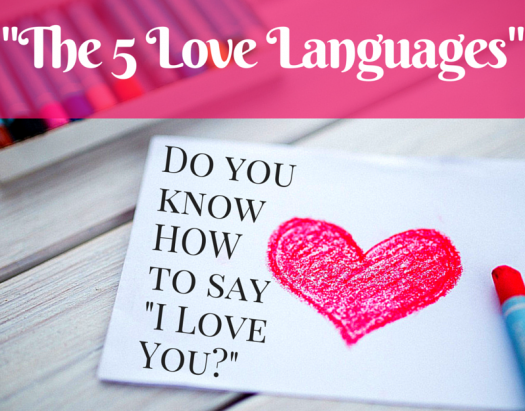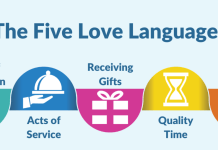Dr. Gary Chapman coined the term love language in his 1995 book “The Five Love Languages: How to Express Heartfelt Commitment to Your Mate”. There are five ways we express and experience love (he calls them “love languages”): Gift Giving, Quality Time, Physical Touch, Acts of Service (Devotion), and Words of Affirmation.
But the love languages aren’t just for romance! You can use the love languages to appreciate people in business, to support friends and to show a partner you care. Let’s go through the 5 and see which one sounds like you:
To feel really loved, some people are more sensitive to gifts and actions, some to physical touch, others to time spent together while some respond to encouraging words.
A person usually has one primary and one secondary love language.
So what’s your language of love? Take the test and find out here >>
Which one of these speaks to the way you feel cared for or like to show you appreciate someone:
1) Quality Time
 Quality time is about spending time together enjoying each other’s company.
Quality time is about spending time together enjoying each other’s company.
People who need quality time crave alone time with their loved one, want to catch up with them by having time alone where they can talk and bond.
You need alone time if you find yourself constantly desiring to be with someone and not just hear from them or write to them. You do not feel satisfied or happy until you can be with the person or people you love.
2) Physical Touch
 Physical touch is showing love through hugging, cuddling, being intimate or simply putting a caring hand on someone’s shoulder.
Physical touch is showing love through hugging, cuddling, being intimate or simply putting a caring hand on someone’s shoulder.
People who need physical touch want you to hug them, they want cuddle time and always show “PDA” or public displays of affection to feel that you love them and to demonstrate their love for those they care about.
You need physical touch if you feel lonely and lost if you have not been physically near a loved one. You constantly crave to be close to those you care about and demonstrate your love for them with hugs, massages and even sitting close to others.
3) Gifts
 The love language gifts does not have to be large or extravagantly expensive gifts, it can be notes, CD’s, flowers or leaving a pastry. These small gifts are tokens of love to the giver or receiver.
The love language gifts does not have to be large or extravagantly expensive gifts, it can be notes, CD’s, flowers or leaving a pastry. These small gifts are tokens of love to the giver or receiver.
People who need gifts feel validated when you spend money and/or time picking something out for them. Often times, the saying, ‘it is the thought that counts’ really applies here.
You need gifts if you think or wait anxiously for holidays or birthdays to see what your loved ones might get you. Gifts are usually a big test in relationships for people who speak the gift love language.
4) Acts of Service
 Acts of service are acts of love when someone does an action for the other. This can be cleaning, cooking, driving or even doing an errand. By doing that act of service the other person feels love or is showing their love.
Acts of service are acts of love when someone does an action for the other. This can be cleaning, cooking, driving or even doing an errand. By doing that act of service the other person feels love or is showing their love.
People who need acts of service will sometimes ask their loved ones for favours or errands not because it is easier, but rather because they need the affirmation of the other person’s love.
You need acts of service if you feel unwanted or unimportant if someone does not follow through on a promise or do something that you ask.
5) Words of Affirmation
 Words of affirmation are verbal clues for others to express how much they love and care about someone. Words of affirmation can also be compliments and reassurances that confirm inner love in an outer way.
Words of affirmation are verbal clues for others to express how much they love and care about someone. Words of affirmation can also be compliments and reassurances that confirm inner love in an outer way.
People who need words of affirmation need to hear from the people they love frequently and need to hear, out loud what the other person is thinking to feel loved.
You need words of affirmation if you find yourself constantly needing to hear from your loved one to get reassurance from them. People who want words of affirmation might also fish for compliments because this is the way they feel most loved.
Typically people have one main love language and one secondary one. It is important to know these so you can ask for what you need and show your partners, friends and colleagues appreciation in the way they like to receive it.
So what’s your language of love? Take the test and find out here >>





